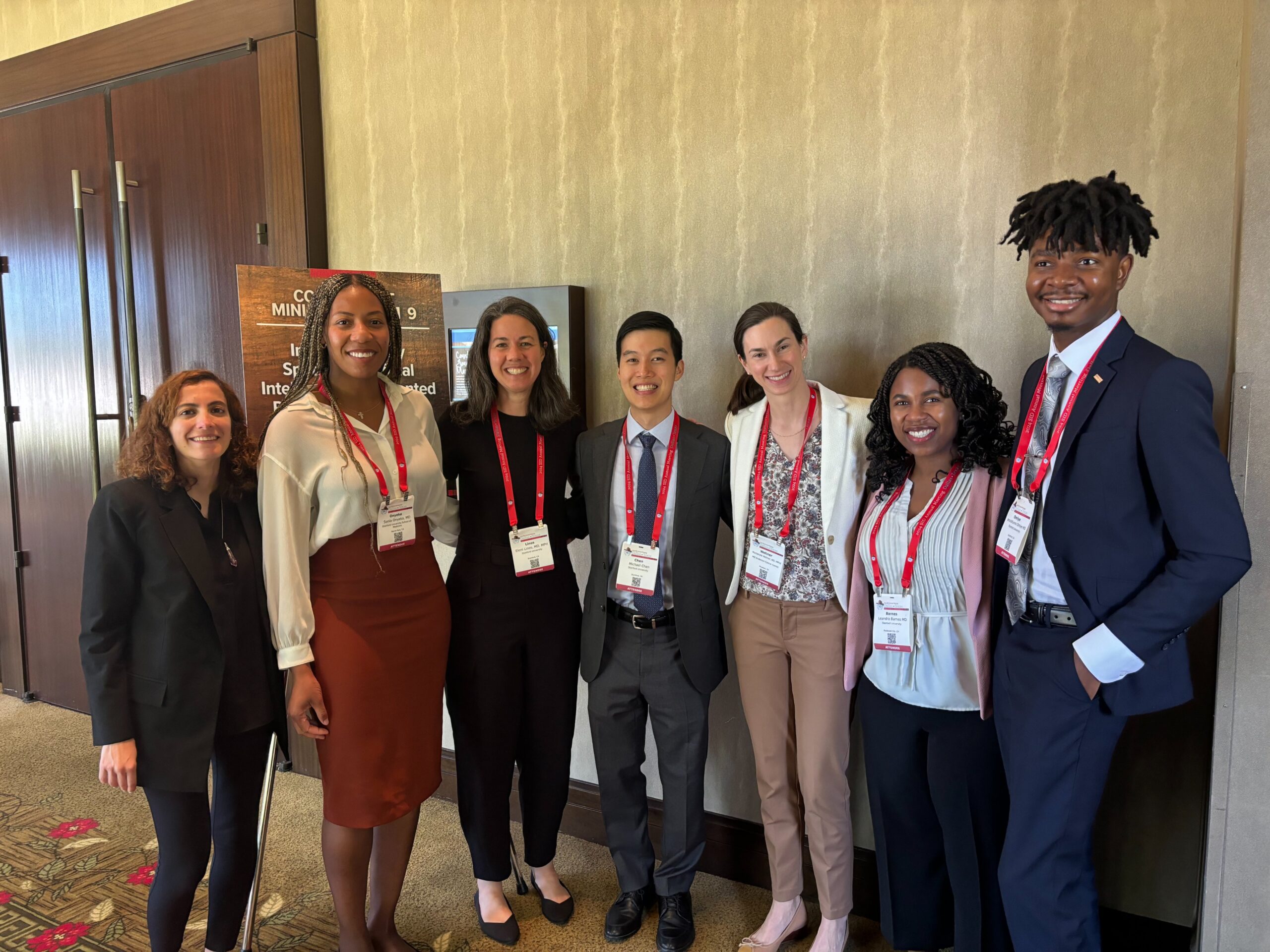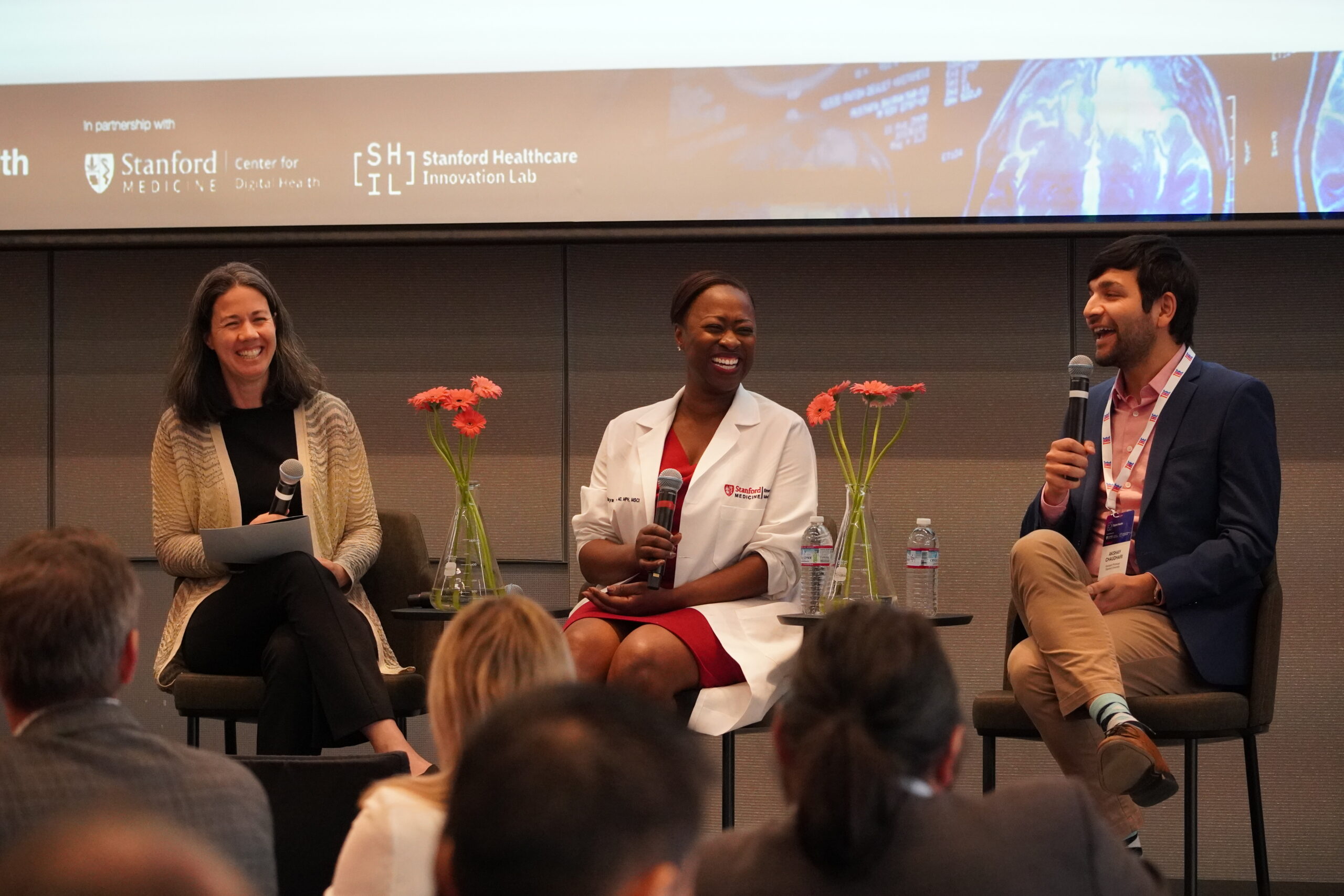
Pioneering Digital Health: Stanford’s Center Transforms Lives Through Innovation and Collaboration
#Methods
Eleni Linos, MD, DrPH, MPH (third from left), with delegates at the 2024 Digital Health Summit, hosted by the Stanford School of Medicine Center for Digital Health
After a splashy fall 2023 relaunch, the Stanford School of Medicine Center for Digital Health (CDH) continues to pioneer new frontiers in health care. “The accelerated pace of innovation in artificial intelligence (AI), telemedicine, informatics, and virtual reality, combined with the fact that after the COVID-19 pandemic, everyone is comfortable online, makes this a critical moment for digital health,” says CDH Director Eleni Linos, MD, DrPH, MPH, who is also an associate dean of research and a professor at Stanford. “Our role building a center at Stanford focusing on health in a digital world couldn’t come at a better time.”
CDH’s mission is anchored to three pillars: education, research, and thought leadership. “My hope is that CDH will be the best place for catalyzing innovative research and training the next generation of leaders, and in addition act as a hub that brings together the best minds, not just within the School of Medicine but across the university – academics from the fields of computer science, engineering, law, the business school, and the School of Sustainability, as well as Silicon Valley industry, regulators, nonprofits, and philanthropists,” says Linos. “The idea is to really become that connector across all of these different fields.”
Linos’ infectious enthusiasm is well merited. She and her team – which includes CDH Executive Director Michael Avanti Lopez; Department of Medicine Chair and Associate Director Euan Ashley, MD, PhD; associate directors Maya Adam, MD, and Fatima Rodriguez, MD, MPH; affiliated faculty; an impressive roster of fellows; and an advisory board representing a wide range of expertise in and outside of healthcare – are well on their way to achieving their lofty goals.
Breaking Down Barriers to Foster Cross-Disciplinary Partnerships
CDH fosters collaboration across disciplines that have traditionally been siloed. Their Digital Health Leaders Lunch Series brings together Stanford faculty with expertise in biodesign, medicine, engineering, and wearable electronics (eWear) to discuss their work in digital health, explore common areas of interest, and share resources. They also boast a new Digital Health Scholars program to develop the next generation of digital health researchers through individualized learning and mentorship for trainees and junior faculty.
In February 2024, CDH hosted the 2024 Digital Health Summit, in partnership with Times Higher Education and the Stanford Healthcare Innovation Lab. The two-day hybrid online/in-person conference included 192 attendees from 23 countries representing 123 institutions or organizations across the globe, as well as 38 expert speakers.

Eleni Linos, MD, DrPH, MPH (left), participates in a panel discussion at the 2024 Digital Health Summit, hosted by the Stanford School of Medicine Center for Digital Health
“The accelerated pace of innovation in artificial intelligence (AI), telemedicine, informatics, and virtual reality, combined with the fact that after the COVID-19 pandemic, everyone is comfortable online, makes this a critical moment for digital health.”
– Eleni Linos, MD, DrPH, MPH
Where Music Meets Anesthesia
Unique cross-disciplinary teamwork yields innovative, boundary-pushing projects. CDH has awarded five $50,000 inaugural Pilot Grants supporting work related to digital health. One example is an unusual collaboration between the departments of anesthesiology, perioperative pain medicine, and music to develop Tracheal Acoustic Monitoring, a wearable device designed for the pediatric setting that detects acoustic data with a high degree of sensitivity in real time while patients are under sedation or anesthesia. Using machine learning, the device detects early signs of airway obstruction with the aim of reducing the incidence and severity of hypoxia during procedures and in the recovery room.
“We are so proud of the work our pilot award teams are doing,” says Linos. “We create opportunities to bring these teams together at regular intervals to discuss updates, focus on future grant writing, and to help one another through challenges and to overcome roadblocks. There is so much value to bringing people together in person because it sparks collaborations that wouldn’t otherwise happen.” CDH is expecting to fund another five pilot grants for 2024-25 that explicitly call for multidisciplinary collaboration, bringing their total investment in these teams to date to $500,000. Winners of this second round of pilot grants will be announced in October 2024.
The Right Message to the Right People in the Right Way
CDH faculty have already published several research projects that span a broad range of disciplines and leverage digital solutions to improve human health. In one international collaboration, CDH investigators helped develop an Instagram-based public messaging campaign about the dangers of indoor tanning. They targeted specific groups known to be most likely to indulge in this skin-cancer-promoting activity – women ages 18 to 30 years in Kentucky, Nebraska, Ohio, or Tennessee, and men ages 18 to 45 years in California – using messaging that would resonate with them specifically, such as its rapid aging effects. They employed Meta algorithms to ensure that the messages reached their intended targets, resulting in a high degree of engagement. Other CDH collaborations have leveraged online messages to address loneliness and increase vaccine acceptance.
“We’re at this critical moment in human history where technology and AI are transforming people’s lives, including the way they care for their bodies and minds to prevent disease, and the way they receive treatment for medical conditions,” says Linos. “These types of technologic innovations are transforming healthcare now; it’s not just a future goal we are aiming to solve.” This innovation benefits both patients and providers. “There is a huge problem with burnout with the healthcare workforce right now [following the COVID-19 pandemic],” says Linos. “If technology can be used to not only improve the patients’ experience but also improve the doctors’ life, then it’s a win-win.”
Preparing for a Very Different Future
“My hope is that CDH will help catalyze research that wouldn’t otherwise be possible. Research that’s collaborative, multidisciplinary, and is nimble in responding to the challenges that our world faces,” says Linos. “I’m also really hopeful that we can train the next generation of scientists and leaders in rigorous scientific methods in digital health as well as in the ethical implications of their research.” With a committed team, dedicated advisers both within and outside of Stanford, and the support of leadership from the School of Medicine and Department of Medicine, CDH is well on its way to becoming a global leader in digital health.
